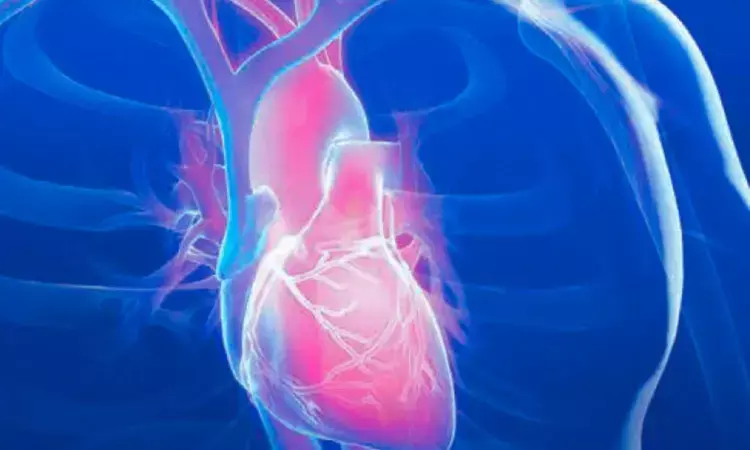- Home
- Medical news & Guidelines
- Anesthesiology
- Cardiology and CTVS
- Critical Care
- Dentistry
- Dermatology
- Diabetes and Endocrinology
- ENT
- Gastroenterology
- Medicine
- Nephrology
- Neurology
- Obstretics-Gynaecology
- Oncology
- Ophthalmology
- Orthopaedics
- Pediatrics-Neonatology
- Psychiatry
- Pulmonology
- Radiology
- Surgery
- Urology
- Laboratory Medicine
- Diet
- Nursing
- Paramedical
- Physiotherapy
- Health news
- Fact Check
- Bone Health Fact Check
- Brain Health Fact Check
- Cancer Related Fact Check
- Child Care Fact Check
- Dental and oral health fact check
- Diabetes and metabolic health fact check
- Diet and Nutrition Fact Check
- Eye and ENT Care Fact Check
- Fitness fact check
- Gut health fact check
- Heart health fact check
- Kidney health fact check
- Medical education fact check
- Men's health fact check
- Respiratory fact check
- Skin and hair care fact check
- Vaccine and Immunization fact check
- Women's health fact check
- AYUSH
- State News
- Andaman and Nicobar Islands
- Andhra Pradesh
- Arunachal Pradesh
- Assam
- Bihar
- Chandigarh
- Chattisgarh
- Dadra and Nagar Haveli
- Daman and Diu
- Delhi
- Goa
- Gujarat
- Haryana
- Himachal Pradesh
- Jammu & Kashmir
- Jharkhand
- Karnataka
- Kerala
- Ladakh
- Lakshadweep
- Madhya Pradesh
- Maharashtra
- Manipur
- Meghalaya
- Mizoram
- Nagaland
- Odisha
- Puducherry
- Punjab
- Rajasthan
- Sikkim
- Tamil Nadu
- Telangana
- Tripura
- Uttar Pradesh
- Uttrakhand
- West Bengal
- Medical Education
- Industry
Tafamidis in ATTR-CM: Study Reports 39 Percent Mortality, Calls for Better Treatment Strategies

USA: A multicenter study evaluating long-term outcomes of tafamidis in patients with transthyretin amyloid cardiomyopathy (ATTR-CM) has provided valuable insights into disease progression and survival rates. The findings were published online in JACC: CardioOncology on February 11, 2025.
New real-world data suggest that two out of every five patients with transthyretin amyloid cardiomyopathy treated with tafamidis (Vyndamax and Vyndaqel; Pfizer) may not survive beyond four years. However, despite the high mortality rate, researchers emphasize that these findings should be viewed positively, considering that tafamidis was the first approved treatment for ATTR-CM and has significantly advanced disease management in recent years.
The ATTR-ACT trial established that tafamidis improves survival and reduces cardiovascular hospitalizations in transthyretin amyloid cardiomyopathy, a progressive and life-threatening condition caused by the deposition of misfolded transthyretin proteins in the heart. This leads to restrictive cardiomyopathy and heart failure. As disease recognition and early diagnosis improve, the epidemiology of ATTR-CM is rapidly evolving. Tafamidis, the only approved disease-modifying therapy, stabilizes transthyretin to slow disease progression and enhance survival. However, real-world long-term data on its effectiveness remain limited, highlighting the need for further research on tafamidis outcomes in clinical practice.
Against the above background, Ahmad Masri, Amyloidosis Center, Knight Cardiovascular Institute, Oregon Health & Science University, Portland, Oregon, USA, and colleagues aimed to assess the long-term clinical outcomes of patients with ATTR-CM receiving tafamidis treatment in a contemporary setting.
For this purpose, the researchers enrolled patients with ATTR-CM who had received at least one dose of tafamidis between 2018 and 2021 at five amyloidosis centers in the United States, assessing all-cause mortality as the primary outcome.
The following were the key findings of the study:
- The study included 624 patients with a mean age of 76.9 ± 8.4 years, of whom 12.5% were female and 17.5% were Black.
- Among the participants, 17.5% had variant ATTR-CM.
- At the time of tafamidis initiation:
- 52% had New York Heart Association (NYHA) functional class II.
- 34% had NYHA functional class III.
- 40% were classified as National Amyloidosis Center (NAC) Stage ≥II.
- 38% were in Columbia Stage ≥II.
- The median NT-proBNP level was 1,914 (957-3,914) pg/mL.
- Over a median follow-up of 43.2 months, 38.6% of patients died.
- The probability of survival at 65 months was 54.1%.
- In a subgroup of patients who received tafamidis within six months of their ATTR-CM diagnosis (n = 397, 63.6%), the survival probability at 65 months was 49.6%.
The researchers revealed that in a contemporary cohort of ATTR-CM patients treated with tafamidis, 39% of patients died over a median follow-up of 43 months, with a 54% survival probability at 65 months. They note that continuous evaluation of the evolving disease trajectory and patient outcomes remains crucial for advancing research in this field.
"Further efforts are needed to deepen the understanding of the ATTR-CM burden, its progression, and strategies to enhance patient outcomes beyond existing therapies," the researchers concluded.
Reference:
Masri A, Bhattacharya P, Medoff B, et al. A multicenter study of contemporary long-term tafamidis outcomes in transthyretin amyloid cardiomyopathy. JACC CardioOncol. 2025;Epub ahead of print.
Dr Kamal Kant Kohli-MBBS, DTCD- a chest specialist with more than 30 years of practice and a flair for writing clinical articles, Dr Kamal Kant Kohli joined Medical Dialogues as a Chief Editor of Medical News. Besides writing articles, as an editor, he proofreads and verifies all the medical content published on Medical Dialogues including those coming from journals, studies,medical conferences,guidelines etc. Email: drkohli@medicaldialogues.in. Contact no. 011-43720751


